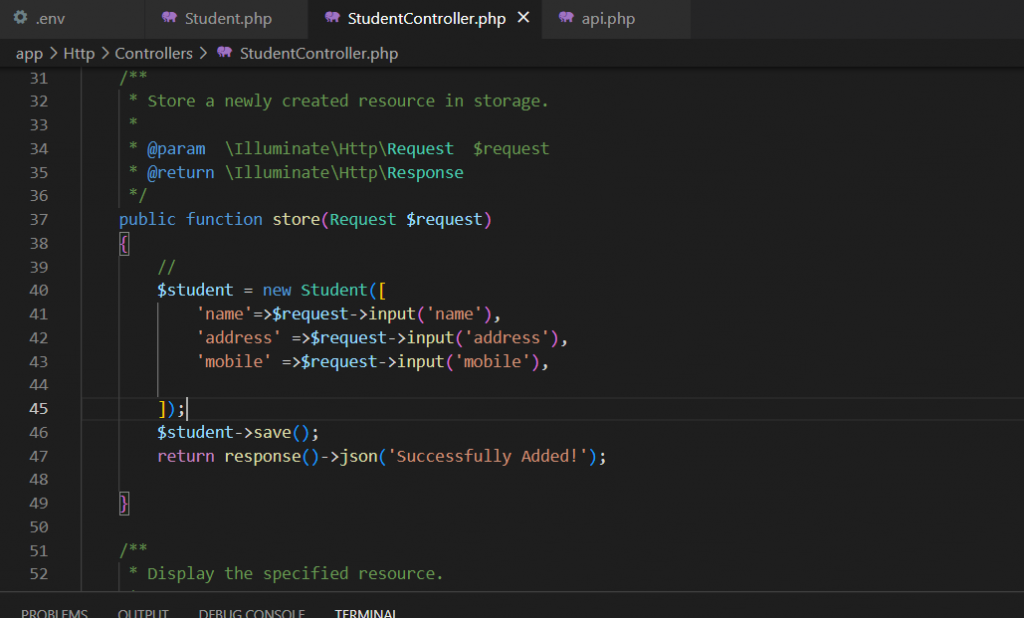Someone or something that is articulate, expressive, or compelling in speech or writing is referred to as “eloquent.” Programmers typically use the term “Eloquent” to refer to the Object-Relational Mapping (ORM) system integrated into the Laravel PHP web application framework, known as Eloquent ORM.
Eloquent ORM provides a simple and elegant way to interact with databases by allowing developers to work with database records as objects in their code. It provides an abstraction layer that allows developers to write database queries in a way that is easy to read and maintain, while also being performant and secure.
Example of Eloquent ORM in Laravel Php:

The images above show an example of how to insert or store a raw data in database using eloquent in the Controller Part of Laravel. In Laravel, the controller is the part of the application that handles requests from the user and sends responses back. For example, if a user submits a form on a web page, the controller is responsible for processing the data from the form and storing it in the database. The Student name is based on the class model in the Model part like the example below.

Furthermore, the image above shows the model part which the developer must make a model of the database here. The developer has created a model for a database table called “students”. This is done by creating a new PHP class called Student that extends Laravel’s Model class. The Student class defines the table name using the $table property, and it can also define any relationships or custom methods that are needed to interact with the database.
In addition, Laravel the model is the part of the application that handles interactions with the database. It acts as an intermediary between the database and the rest of the application, allowing developers to work with the database using objects and methods rather than writing SQL queries directly.
Moreover, Eloquent is one of the most popular features of the Laravel framework and offers several advantages over traditional SQL database interaction. However, there are also some potential drawbacks to consider. Here are some of the main pros and cons of using Eloquent in Laravel:
Pros:
- Eloquent provides a simple and intuitive way to interact with databases using object-oriented programming, which can be more readable and maintainable than writing raw SQL queries.
- Eloquent abstracts away many of the details of database interaction, such as managing database connections and preventing SQL injection attacks, which can save time and reduce errors.
- Eloquent makes it easy to define relationships between tables in the database, such as one-to-one, one-to-many, and many-to-many relationships, which can simplify querying and joining data across multiple tables.
- Eloquent includes powerful features such as soft deleting, which allows developers to mark database records as deleted without actually removing them from the database, and mass assignment protection, which helps prevent security vulnerabilities.
Cons:
- Eloquent can be slower than writing raw SQL queries in some cases, especially when working with large datasets or complex queries.
- Eloquent relies heavily on naming conventions, which can lead to confusion or errors if table or column names do not match the expected conventions.
- Eloquent can sometimes be more difficult to debug than raw SQL queries, as it can generate complex SQL queries under the hood that are not immediately visible in the code.
- Eloquent can sometimes be less flexible than writing raw SQL queries, as it abstracts away many of the details of database interaction and can be limited in the types of queries it can generate.
In conclusion, Eloquent is a powerful and popular ORM (Object Relational Mapper) in Laravel that simplifies database interaction by providing a simple and intuitive way to work with databases using object-oriented programming. Eloquent abstracts away many of the details of database interaction, such as managing database connections, preventing SQL injection attacks, and defining relationships between tables, which can save time and reduce errors.
However, there are also some potential drawbacks to consider when using Eloquent, such as slower performance in some cases, reliance on naming conventions, and reduced flexibility compared to writing raw SQL queries. Therefore, it’s important to weigh the pros and cons of using Eloquent and use it judiciously in situations where it provides clear benefits over other approaches. Overall, Eloquent is a valuable tool in the Laravel ecosystem that can help developers build scalable, maintainable, and secure applications.
